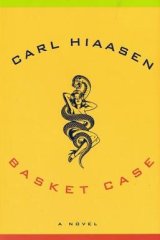Basket Case
Basket Case, published in 2002, is the ninth novel by Carl Hiaasen. It is a crime novel set in Florida that centers on the death of singer Jimmy Stoma, the former lead man of "Jimmy and the Slut Puppies". This novel marks the first time Hiaasen used first-person point of view to deliver the novel. In previous works, he used third-person view. In addition to being a murder mystery, the novel also explores a career in newspaper journalism, and is a screed against the downsizing of American newspapers and their corporate owners' emphasis on profitability over depth.
Jack Tagger Jr., an obituary writer for the South Florida Union-Register, becomes intrigued upon seeing a death notice for James Bradley Stomarti, also known as Jimmy Stoma. Jimmy was the lead man of the rock band Jimmy and the Slut Puppies. Jack interviews Jimmy's widow, pop singer Cleo Rio, who says that Jimmy died in a diving accident in the Bahamas. Cleo plugs her new upcoming album Shipwrecked Heart, with a title song written by Jimmy and herself. However, after the obituary is printed, Jimmy's sister Janet tells him Cleo lied: Jimmy was working on his own comeback album. Jack gets more suspicious when he sees Jimmy's body in a funeral home and finds that no autopsy was performed. However, before Jack can call for one, the body is cremated. Jack used to be an investigative reporter, but was demoted to the obituary beat after publicly insulting Race Maggad III, the CEO of the newspaper's publishing company. His ambition is to climb back onto the front page by "yoking my byline to some famous stiff." Jack's job of writing obituaries all day long has made him become morbidly obsessed with death, especially his own. Each year, Jack obsesses about people who died at his age, and about the fate of his deceased father Jack Tagger Sr., who disappeared when Jack was young. His mother refuses to say when Jack Sr. died, and he is paranoid about not living as long as his father did. These obsessions cost him his favorite girlfriend, Anne. Despite the refusal by Jack's editor, Emma, to let him investigate the rock star's death, he continues regardless. Parked outside Cleo's condominium one night, Jack sees her with a young male lover. Emma relents and gives Jack a week to investigate Jimmy's death. He tracks down Jay Burns, the Slut Puppies' old keyboardist, and Jimmy's dive partner. Jay is heavily stoned, but to Jack it is obvious he is lying about something. Later that night, a burglar breaks into Jack's apartment and attacks him with the frozen corpse of a dead Savannah Monitor lizard kept in his freezer. Jack is beaten unconscious, but the burglar disappears. A few hours later, two police detectives show up and tell him Jay has been found murdered. With his apartment trashed, Jack goes to stay with Emma. When the two search Jay's boat, an external hard drive is found beneath the false bottom of a scuba tank. Meanwhile, Jack is depressed to hear from Carla Candilla, Anne's teenaged daughter, that Anne is marrying a spy novelist. Meeting her at a club, he catches sight of Cleo's boyfriend, a man who calls himself "Loreal" and claims to be her record producer. Jack and Emma are alarmed when Janet disappears from her home; Jack finds a small patch of blood on her carpet. With the help of Jack's best friend, sports writer Juan Rodriguez, Jack decrypts the hard drive and finds it contains master recordings for Jimmy's unfinished album. Listening to it, Jack is still baffled in looking for a motive for Jimmy's presumed murder. To Jack's surprise, Emma spends the night with him at his apartment. A few days later, she excitedly tells him that Jimmy's bassist, Tito Negroponte, was shot but not killed in Los Angeles. Jack flies there and interviews Tito, who puts his finger on why Cleo killed Jimmy: she wanted a song from his album, titled "Shipwrecked Heart", for herself. Jack listens to the song, telling Emma that Cleo is desperate to put out another successful song before she fades from the scene, and believes Jimmy's song was better than anything she can write. Still, Jack admits that he cannot prove that Cleo killed Jimmy. Cleo's bodyguard kidnaps Emma, and she demands the master in exchange for her. At Lake Okeechobee, Jack and Juan meet the bodyguard and Loreal, and trade the master for Emma. The bodyguard tries to kill all of them, but ends up upending the airboat he is driving, with fatal results for himself and Loreal. On Jack's 47th birthday the next day, his mother sends him a card and an obituary revealing that Jack Sr. died at age 46. He feels relieved to have lived longer than his father. Janet resurfaces, having fled Cleo's goons, and admits that she switched the tags on a pair of coffins at the funeral home, meaning Jimmy was actually buried in the wrong man's grave. At her request, the body is exhumed, and a pathologist finds that Jimmy was drugged before he drowned. Cleo is convicted of murder; Jack sails back onto the front page covering the story while Jimmy's posthumous album is a success. A subplot focuses on Jack's ongoing conflict with Race Maggad III, and the ailing state of the Union-Register since Maggad bought it. Maggad's downsizing policy leads to more space in the paper devoted to advertisements than to news, fewer staffers employed, and stories that are deferential to business interests and lacking in depth. Jack finds an ally in MacArthur Polk, the newspaper's former publisher, who owns a large number of shares in Maggad's publicly traded company. Maggad is desperate to buy the shares back before two foreign companies initiate a hostile takeover. Polk dies and names Jack as trustee of his shares, with instructions that Maggad can have the stock back only if he sells the Union-Register back to Polk's widow Ellen. After Maggad reluctantly agrees, Ellen restores the paper's obituary section to its format prior to Maggad's purchase, arranges for more reporters to be hired, and expands its news coverage. Emma is promoted, and the novel ends as she is trying to talk Jack back from his leave of absence from journalism.
Translation
Translate and read this book in other languages:
Select another language:
- - Select -
- 简体中文 (Chinese - Simplified)
- 繁體中文 (Chinese - Traditional)
- Español (Spanish)
- Esperanto (Esperanto)
- 日本語 (Japanese)
- Português (Portuguese)
- Deutsch (German)
- العربية (Arabic)
- Français (French)
- Русский (Russian)
- ಕನ್ನಡ (Kannada)
- 한국어 (Korean)
- עברית (Hebrew)
- Gaeilge (Irish)
- Українська (Ukrainian)
- اردو (Urdu)
- Magyar (Hungarian)
- मानक हिन्दी (Hindi)
- Indonesia (Indonesian)
- Italiano (Italian)
- தமிழ் (Tamil)
- Türkçe (Turkish)
- తెలుగు (Telugu)
- ภาษาไทย (Thai)
- Tiếng Việt (Vietnamese)
- Čeština (Czech)
- Polski (Polish)
- Bahasa Indonesia (Indonesian)
- Românește (Romanian)
- Nederlands (Dutch)
- Ελληνικά (Greek)
- Latinum (Latin)
- Svenska (Swedish)
- Dansk (Danish)
- Suomi (Finnish)
- فارسی (Persian)
- ייִדיש (Yiddish)
- հայերեն (Armenian)
- Norsk (Norwegian)
- English (English)
Citation
Use the citation below to add this book to your bibliography:
Style:MLAChicagoAPA
"Basket Case Books." Literature.com. STANDS4 LLC, 2025. Web. 21 Feb. 2025. <https://www.literature.com/book/basket_case_1907>.








Discuss this Basket Case book with the community:
Report Comment
We're doing our best to make sure our content is useful, accurate and safe.
If by any chance you spot an inappropriate comment while navigating through our website please use this form to let us know, and we'll take care of it shortly.
Attachment
You need to be logged in to favorite.
Log In